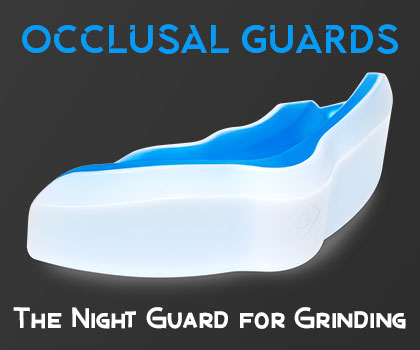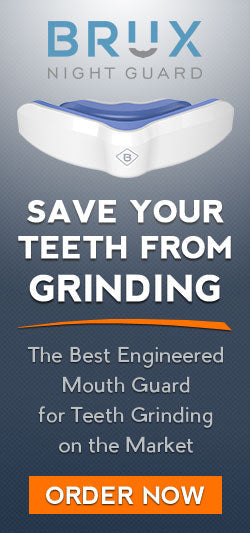Occlusal Guards: The Dental Night Guard Splint for Bruxism / Grinding

What is an Occlusal Guard?
An occlusal guard is a removable dental appliance that fits over the teeth in one arch to prevent tooth wear and damage from grinding or teeth clenching. It is sometimes referred to as a splint.
What Does an Occlusal Guard Do?
When a person grinds their teeth, they put a significant amount of pressure on the teeth and jaw, which can lead to various dental problems such as worn down enamel, tooth sensitivity, jaw pain, and even cracked or broken teeth.
An occlusal splint works by providing a cushion between the upper and lower teeth, preventing them from coming into direct contact and reducing the impact of grinding and clenching.
By wearing this type of guard at night, when most people tend to grind their teeth, individuals can protect their teeth from damage and alleviate the symptoms of bruxism, such as headaches and jaw pain.
Additionally, these types of bite guards in some cases help with temporomandibular joint (TMJ) disorders by helping to realign the jaw and relieve pressure on the joint.
Overall, these guards work as a protective barrier for the teeth and jaw, helping to maintain oral health and prevent the need for extensive dental treatments in the future.
It is important to consult with a dentist to determine if an occlusal guard is necessary and to ensure that it fits properly for maximum effectiveness.
Types of Occlusal Guards
There are three main types of occlusal guards:
- Stock occlusal guards - These are inexpensive, ready-made guards that can be purchased at stores. They offer basic protection but don't fit the teeth perfectly.
- Boil-and-bite occlusal guards - A boil-and-bite guard is semi-custom made. You soften it in hot water and then bite down to mold it to your teeth. These fit better than stock night guards and can mold to the top or bottom teeth.
- Custom-made occlusal guards - Custom guards are fabricated by at your dental office or a dental lab from a mold of your teeth. These guards, sometimes made of acrylic, fit your teeth precisely and offer good protection.
Who Needs an Occlusal Guard?
These dental guards may be recommended for:
- People who grind and clench their teeth (bruxism). This can wear down tooth enamel.
- Those with symptoms like tooth sensitivity or jaw pain from tmj.
- Athletes who play contact sports that may result in blows to the face and mouth.
- Those undergoing orthodontic treatment to protect braces.
If you grind your teeth or notice symptoms of bruxism or your dentist identifies wear on your teeth, a night guard can protect against further damage. Athletes can also benefit from protection during sports.
Benefits of Teeth Grinding Guards
Wearing an night guard offers several notable benefits:
- Prevents excessive wearing down of teeth from grinding.
- Protects teeth from fracture.
- Reduces symptoms like tooth sensitivity and pain in the jaw muscles.
- Can reduce tension headaches.
- Protects dental work like crowns, fillings, and braces.
- Shields teeth from trauma during sports.
- Aids with oral health.
Simply put this bite splint creates a protective barrier between the upper and lower teeth. This prevents damage from occlusion (contact between opposing teeth) during clenching and grinding episodes.
Risks of Wearing an Occlusal Guard
The occlusal mouth guards is normally quite safe. However, potential risks include:
- Discomfort or irritation where the appliance contacts gum tissue.
- Buildup of odors and bacteria if not cleaned regularly.
- Changes in jaw joint alignment or bite over time if worn every night (less likely with custom guards).
To avoid issues, have any discomfort or changes addressed promptly by your dentist. Follow home care guidelines provided to keep your guard clean. Also, schedule regular dental exams while wearing a mouthguard long-term.
Occlusal Splint Home Care Tips
To keep your mouth guard fresh and prevent bacterial growth:
- Rinse under cold running water before and after each use.
- Use a toothbrush and toothpaste to gently clean all surfaces.
- Soak it in denture cleaner or a bleach solution periodically.
- Store in a perforated plastic container to allow air circulation.
- Don't soak in hot water, which can warp appliances.
Follow all home care instructions from your dental provider. Proper cleaning prevents foul odors, stains, and plaque accumulation.
Dental Guard Fitting Tips
To ensure your bite guard fits comfortably and properly:
- Try inserting it right before bed vs. earlier in the evening.
- Gently wedge it onto your teeth using your fingertip.
- Make sure it sits evenly across all teeth.
- Bite down gently to allow your jaw muscles to relax into position.
- Don't worry if it feels snug at first - you'll adjust.
- Inform your dentist if it feels too loose, tight, or uneven.
It can take some time to get used to sleeping with a mouthguard. Try it for a few nights and schedule any adjustments needed with your dentist.
FAQs About Occlusal Guards
Here are answers to some frequently asked questions about occlusal guards:
Are occlusal guards uncomfortable?
It's common to feel awareness of the guard at first. But custom mouthguards should not be painful. Discomfort often diminishes within 1-2 weeks once you become accustomed to wearing it.
Can occlusal guards be worn during the day?
Teeth grinding guards can help protect your teeth during sleep. However, custom nightguards can typically be worn occasionally during waking hours too if desired. Ask your dentist if you have grinding symptoms during the day.
How much do occlusal guards cost?
Stock guards cost $10-$30. Boil-and-bite guards range from $15-$75. Custom mouthguards run $200-$500 but offer the best fit and protection. Many dental insurance plans help offset the cost.
How often must I replace my occlusal guard?
The lifespan varies by type, wear and tear, and proper cleaning. Stock or boil-and-bite guards may need replacing every 6-18 months. A sturdy custom oral appliance guard can last 3-5 years (or longer) before needing a remake.
Can I get my occlusal guard wet?
Guards need to withstand moisture from saliva. But take care not to regularly expose them to very hot, cold, acidic, or sugary liquids which can warp or wear down the plastic material over time.







